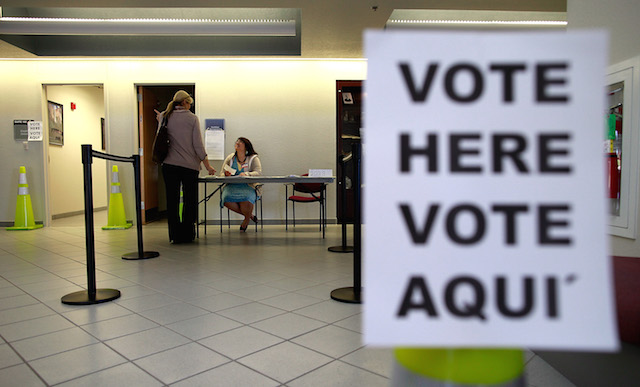Federal Appeals Court Weakens Texas' Discriminatory Voter ID Law

Yesterday, a three-member panel of the Fifth Circuit Court of Appeals decided unanimously that Texas' voter ID law violates the Voting Rights Act (which turns 50 today). It stopped short of overturning the law, but said the lower court must alter it to prevent discrimination that keeps people of color and the poor out of the voting booth.
Passed in 2011, the law is often called one of the strictest in the nation. Texas residents cannot cast their ballots without a government-issued ID, which must be one of the following: a Texas driver’s license, a Texas Election Identification Certificate, a Texas personal ID card issued by the state Department of Public Safety, a Texas concealed handgun license, a U.S. military photo ID card, a U.S. photo citizenship certificate, or a U.S.-issued passport. Before 2011, voters could present a registration certificate, employee and student IDs, utility bills, bank statements, paychecks, government documents or any other piece of government-issued mail that confirmed their address.
The plaintiffs in the case—which included the Department of Justice, civil rights groups and individual Texas voters—argued in 2014 that the law is discriminatory because many poor people and POC don’t have access to these forms of identification or the documentation required to secure them. The federal district court in Texas agreed and also said that the state sought to intentionally disenfranchise the impacted groups. The state appealed the decision to the federal court, saying they were attempting to prevent voter fraud.
The federal panel agreed with the plaintiffs that the law had a discriminatory effect, as described by Section 2 of the Voting Rights Act, which forbids any “voting qualification or prerequisite to voting or standard, practice, or procedure . . . which results in a denial or abridgement of the right of any citizen . . . to vote on account of race or color.”
But it didn’t rule on the assertion that it was purposely discriminatory, instead sending the case back to the district court to decide that point as well as the appropriate remedy. If that court decides that it was on purpose, the federal government could regain approval rights in the development of voter laws in Texas moving forward—a function that was invalidated in the Supreme Court’s 2013 decision in Shelby v. Holder.
The court’s opinion, penned by Judge Catharina Haynes, cites an analysis that found that Hispanic and black registered voters in Texas were 195 percent and 305 percent, respectively, more likely than their white counterparts to not have an approved form of ID. It also discussed evidence that those living in poverty are less likely to use services that require ID and less likely to need a driver’s license, as they typically rely on public transport.
According to The New York Times, the state can still appeal the decision to the full circuit court or the Supreme Court. In a statement issued yesterday, Texas governor Gregg Abbott said, “In light of ongoing voter fraud, it is imperative that Texas has a voter ID law that prevents cheating at the ballot box. Texas will continue to fight for its voter ID requirement to ensure the integrity of elections in the Lone Star State.”
